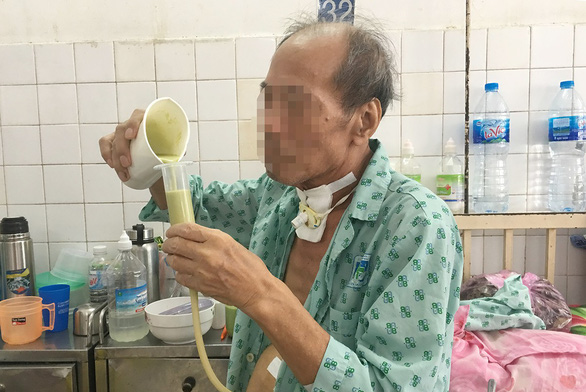 Society
Society

Some 34 per cent of patients suffer from malnutrition when they receive treatment at local hospitals in HCM City.

|
| A patient pours nutritious food into a feeding tube provided by HCM City’s Oncology Hospital. Photo tuoitre.vn |
HCM CITY A 55-year-old woman takes a pair of chopsticks to eat her lunch of bún thịt nướng - a Vietnamese rice noodle bowl with vegetables and grilled pork in a lobby of HCM City’s Oncology Hospital.
She only ate half of the meal before dropping her food.
"I'm tired. I can't continue eating," she said.
According to her relatives, she ate very little when she underwent chemotherapy for breast cancer. She did not receive any nutrition advice from doctors.
The woman was hospitalised in 2016 for breast cancer and her weight has fallen from 52kg to 41kg during treatment, Tuổi trẻ (Youth) online newspaper reported.
Another case is N.X.H, a 68-year-old man, of the Central Highlands province of Đắk Lắk, who has been treated for thyroid cancer for two years at the hospital. He eats the free lunch at the hospital’s gate.
He said he came to the hospital to receive drugs to take at home after a successful surgery.
H also added his children Googled nutrition advice for his disease.
He said he did not know the hospital had an office to offer nutrition advice to patients until he left the hospital.
Causes
A lack of nutritional advice is seen as a major reason for the fact that 34 per cent of patients suffer from malnutrition when they receive treatment at local hospitals in HCM City.
Trần Thị Anh Tường, head of Nutrition Department of HCM City’s Oncology Hospital, said the screening and evaluation of nutritional status of patients were usually conducted in clinical departments.
The doctors and nurses who directly treated patients would have to consult them on how to eat healthily. For patients who suffered from malnutrition, they would be transferred to the hospital’s nutrition department for specific advice, she said.
However, overcrowding at the hospital was one of the reasons why some patients did not receive nutrition advice from doctors, she said.
Moreover, some patients did not ask doctors and nurses for nutritional advice, she said.
Tường said few patients came to the nutrition department for free advice although when she talked with patients she saw the demand for nutritional advice was high.
According to Tường, another problem was that some patients did not follow the nutritional advice of doctors. Some patients had unhealthy eating habits, while others shared their food with relatives to save money.
Solutions
Trần Quốc Cường, head of the Planning Office of HCM City’s Nutrition Centre, said hospitals should provide meals for patients, covered by health insurance fees, instead of allowing them to be self-sufficient.
The food provided for patients also should be checked for hygiene and nutritional value.
Cường said at overseas hospitals, patients often received comprehensive care, including meals, covered by health insurance. Therefore, patients did not need relatives to take care of them, except for children.
“The thing that excites me the most is that the food is very healthy and nicely presented,” he said.
Patients often fell into a state of poor eating because they were ill, so the presentation of food was important to make them eat more, he said.
Patients are served three meals a day, while those at risk of being malnourished would be served an extra meal, he said.
Lương Ngọc Khuê, head of the Ministry of Health’s Department of Medical Examination and Treatment, said nutrition played an important role in improving treatment quality.
Thus, the ministry would require hospitals to focus on ensuring nutrition for patients to improve treatment quality, he said.
Lâm Vĩnh Niên, head of Nutrition Department, HCM City’s University Medical Centre, said raising the quality of the nutritional menu for patients was also a solution to the problem.— VNS




